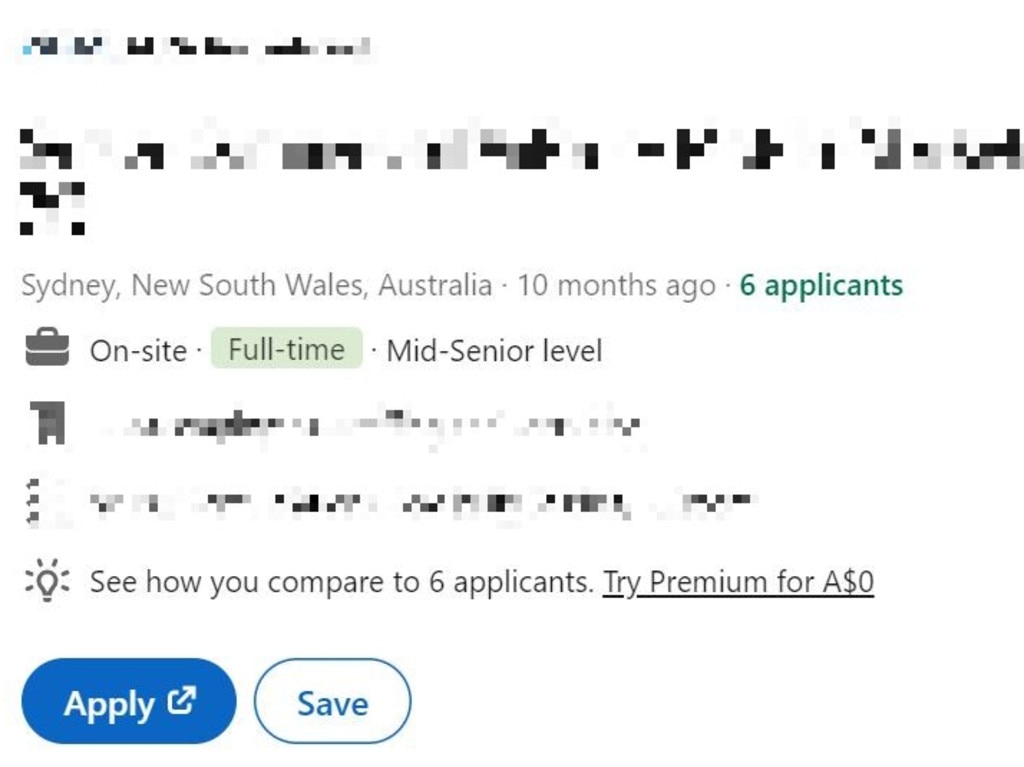‘Waste of time’: Australian employers posting ads for ‘ghost jobs’
Experts have slammed an “unethical” job practice being used by companies across Australia – and it’s far more common than people realise.
Have you ever applied for a job that sounds like the perfect fit for your skill set, to the point where you may be slightly over qualified for the role, but, despite this, never heard back about the application?
Maybe you even had an initial, positive conversation with a recruiter about the role but never heard from them again and weeks later the job listing was still up.
You may have, unknowingly, applied for a ghost job.
A ghost job is essentially a fake job, where companies will post advertisements for positions that appear to be genuine but they actually have no intention of filling.
It’s a tactic that companies will use for various reasons, either to make themselves look better or achieve certain business agendas, and it’s more common than people realise.
Sue Parker previously owned her own recruitment agency and knows that posting fake jobs ads has been rife across Australia for decades.
Now a career and communications strategist at DARE Group Australia, Ms Parker told news.com.au recruiters and companies will often create ghost job ads in order to build their talent bank from the people who apply.
This ensures they have the resources to fill legitimate roles ASAP when they come through.
Another reason could be to give the appearance of being a “highly active and successful agency or business in their market”.


The idea is that if they are posting a lot of new job ads, then their business must be doing well to be able to support all these new roles.
“Fake job ads can also be posted to obtain market intelligence and information on competitors during the interview process,” Ms Parker said.
“The recruitment ecosystem is a pendulum. At times the pendulum swings towards a candidate market others towards a company/job market. Rarely is it in sync. So organisations and recruiters in quieter times can often use fake ads to bump up their activity.”
According to Ms Parker, there is never a situation where a recruiter or a company posting a fake job ad is justified.
“Ghost and fake job ads is a decision pure and simple to deceive and manipulate. It’s unethical and a form of candidate abuse,” she said.
“It causes reputation damage of brands and organisations, financial and time wastage for candidates.”
For candidates that have unknowingly applied for ghost jobs, it can erode their trust in create a level of hyper vigilance that can make them reluctant to apply for roles.
“In a world where trust is at an all-time low and AI taking over many of the hiring processes, it is absolutely reprehensible for an organisation to post fake job ads,” Ms Parker said.
“Transparency and honesty is a professional currency which must never be compromised.”
There are a few different ways to identify a ghost job, with Ms Parker saying vagueness in the copy of the advertisement is a “key giveaway”.
She said if a job has been advertised for more than a month then there is a “high chance” it is a ghost job.

Recruitment expert and Talent Blueprint founding director Michael Berger said the “devil is in the details” when it comes to spotting a ghost job ad.
Mr Berger told news.com.au these types of listings are often vague and will leave out key information like the nature of the work, company name, salary, contact information or even a location.
He believes there has been an increase in ghost job ads in Australia in recent years.
“You need to consider the low unemployment rate and the sheer amount of adverts versus available roles,” he said.
Aussie workers recently shared their own experiences being caught out by ghost jobs in a Reddit forum discussion.
One commenter claimed that recruiters have been using this tactic for the “better part of 20 years”.
“I can’t even count the number of times I’ve applied to a role for it to suddenly be filled, but they just so happen to have another job that pays less and/or worse conditions for the same amount of work,” they said.
Another person claimed the practice was particularly rife in the IT industry, with recruiters posting fake ads to “resume farm” and then bombard candidates with “completely unsuitable jobs in the hope of landing just one of them”.
Some people even admitted to working for recruitment agencies where they would go so far as to interview candidates for these ghost jobs but never had any intention of hiring someone.
Mr Berger believes that ghost jobs are a “waste of everyone’s time” and can cause false hope for genuine job seekers during a difficult time.
He warned that it reflects poorly on the company behind the ad and paints them as being “dishonest and unethical”.
“It’s important to remember that it’s actually illegal to do it under Australian Consumer Law (ACL),” Mr Berger said.
“If you want a pool of candidates for future projects or, in the case of recruitment companies building their database of candidates, then it’s wise to clearly label the job as an EOI, an expression of interest for up-and-coming potential jobs. Then everyone is aware and on the same page.”






